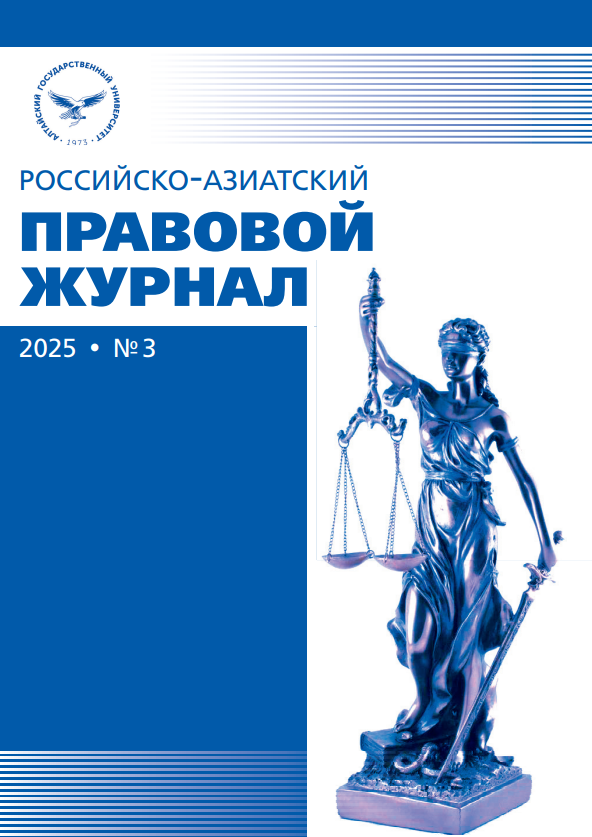DEVELOPMENT OF THE LEGAL FRAMEWORK IN THE PROCESS OF FORMATION OF TECHNOLOGICAL SOVEREIGNTY OF RUSSIA
УДК 342.3 ББК 67.400.51
Abstract
Due to the ongoing changes in the political, economic, social and other spheres of life in Russia, the issueof technological sovereignty is becoming one of the important problems. In this regard, special attentionshould be paid to the formation of a legal framework for its provision. The article examines the main stagesof the development of the legal framework of technological sovereignty and suggests directions for its furtherimprovement.
Downloads
References
2. Francesco Crespi, Serenella Caravella, Mirko Menghini and Chiara Salvatori. European Technological Sovereignty: An Emerging Framework for Policy Strategy // Intereconomics. 2021. №6. URL: https://www.academia.edu/79104607/European_Technological_Sovereignty_An_Emerging_Framework_for_Policy_Strategy (дата обращения: 27.04.2025).
3. Гнидченко А. Сюжеты внешней торговли / под научн. ред. В. Сальникова. М. : Центр макроэкономического анализа и краткосрочного прогнозирования. 2022. Вып. 16. URL: http:// http:// www.forecast.ru/_ ARCHIVE/WW_MONS/2021/16_2021.pdf
4. Карпов Д. Оценка зависимости России от импорта промежуточной продукции. Серия докладов об экономических исследованиях Банка России. М. : Банк России, 2022. №106. URL: https://cbr.ru/content /document/file/144138/wp_106.pdf
5. Наталья Касперская о цифровом суверенитете страны. 26.05.2023. URL: https://arppsoft.ru/blogkasperskaya/importozameshchenie-po/ natalya-kasperskaya-o-tsifrovom-suverenitete-Srany
6. Ковалев С.Г. Технологическая суверенность России в новейшем мировом порядке // Философия хозяйства. 2020. №6. С. 29–47. URL: http://www.philh.ru/index. php/arkhiv-materialov/teksty/327‑sg-kovalev-tekhnologicheskaya-suverennost-rossii-v-novejshem-mirovom-poryadke
7. Аничкин Е.С. Конституционно-правовые основы противодействия антироссийским санкциям // Конституционное и муниципальное право. 2023. №4. С. 2–7.
8. Аничкин Е.С. Правовое обеспечение технологического суверенитета России: современное состояние и резервы совершенствования. URL: https://cyberleninka.ru/article/n/pravovoe-obespechenietehnologicheskogo-suvereniteta-rossii-sovremennoe-sostoyanie-i-rezervy-sovershenstvovaniya/viewer
9. Гареев Т.Р. Технологический суверенитет: от концептуальных противоречий к практическойреализации // Terra Economicus. 2023. №21 (4). С. 52.
10. Потапцева Е.В., Акбердина В.В., Пономарева А.О. Концепция технологического суверенитетав современной государственной политике России // Alter Economics. 2024. №21 (4). С. 818–842. URL:https://doi.org/10.31063 /AlterEconomics/2024.21–4.9
11. Концепция технологического развития на период до 2030 г.: Распоряжение Правительства РФ от 20.05.2023 №1315‑р. URL: http://government.ru/news/48570/
12. Выступление Президента Российской Федерации В.В. Путина с Посланием Федеральному Собранию Российской Федерации от 29.02.2024 г. б/н. URL: http://www.kremlin.ru/acts/bank/50431
Copyright (c) 2025 С. И. Меженская, И. А. Топольскова

This work is licensed under a Creative Commons Attribution 4.0 International License.
Russian-Asian Law Journal is a golden publisher, as we allow self-archiving, but most importantly we are fully transparent about your rights.
Authors may present and discuss their findings ahead of publication: at scientific conferences, on preprint servers, in public databases, and in blogs, wikis, tweets, and other informal communication channels.
Russian-Asian Law Journal allows authors to deposit manuscripts (currently under review or those for intended submission) in non-commercial, pre-print servers such as ArXiv.
Authors who publish with this journal agree to the following terms:
- Authors retain copyright and grant the journal right of first publication with the work simultaneously licensed under a Creative Commons Attribution License that allows others to share the work with an acknowledgement of the work's authorship and initial publication in this journal.
- Authors are able to enter into separate, additional contractual arrangements for the non-exclusive distribution of the journal's published version of the work (e.g., post it to an institutional repository or publish it in a book), with an acknowledgement of its initial publication in this journal.
- Authors are permitted and encouraged to post their work online (e.g., in institutional repositories or on their website) prior to and during the submission process, as it can lead to productive exchanges, as well as earlier and greater citation of published work (See The Effect of Open Access).








